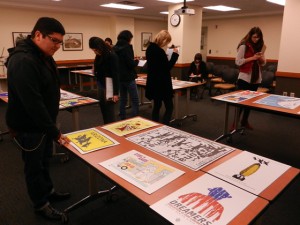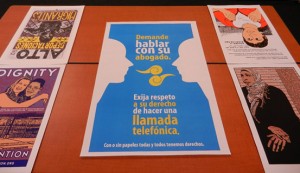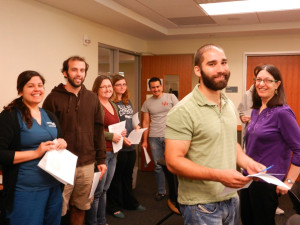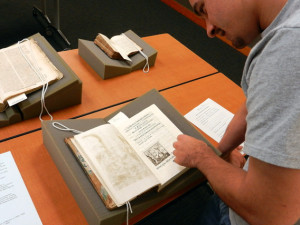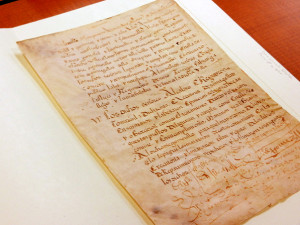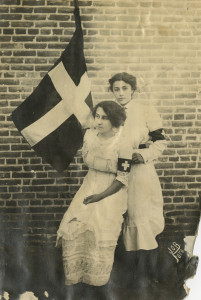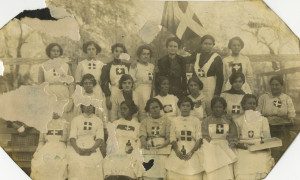
On Monday afternoon, students from Dr. Eric Castillo’s “Mexican American Art and Social Change” course visited Special Collections and were the first patrons to view two newly acquired collections of art prints and posters now residing in our Hispanic Collections.
Hispanic Collections Archivist Lisa Cruces and Coordinator for Digital Projects and Instruction Julie Grob facilitated Dr. Castillo’s students in a survey of Migration Now, a limited-edition portfolio of 37 handmade prints addressing migrant issues created by Justseeds and CultureStrike as well as Con papeles o sin papeles todos tenemos derechos (With papers or without papers we all have rights), 15 posters designed to remind immigrants of their legal rights and protections by La Escuela de Cultura Popular Revolucionaria Martires del 68. Students completed an analysis of the use of specific images and text in the posters as they related to viewpoints expressed therein.
To assist in their study, Cruces compiled a list of Primary Resources for Mexican American Art and Humanities Research. In addition, in her role as the Hispanic Collections Archivist, Ms. Cruces completed a brief Q&A with the class regarding the status of the Hispanic Collections here at UH, the research potential they represent, and plans for growing the archives in the future.
We thank Dr. Castillo and his students for visiting Special Collections and look forward to their continued research in our Hispanic Collections and beyond.
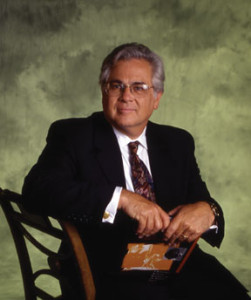
Dr. Kanellos was recently honored by the City of Houston for his work with the “Recovering the U.S. Hispanic Literary Heritage” project
Hispanic Heritage Month came to an end last week, but we would be remiss if we did not mention the recent honor bestowed upon Dr. Nicolas Kanellos, Director of Arte Público Press, by Mayor Annise Parker. As part of the City of Houston’s observance of Hispanic Heritage Month, Kanellos received the Mayor’s Hispanic Heritage Award for Education in recognition for his work with the “Recovering the U.S. Hispanic Literary Heritage” research program.
In the early 1970s Dr. Kanellos founded Revista Chicana-Riqueña, later renamed The Americas Review, and this labor evolved into Arte Público Press which found a home at the University of Houston when he accepted a position here in 1980. Beginning in 1992, Arte Público began the formal work for the “Recovering the U.S. Hispanic Literary Heritage” program. The 2013 catalog of complete titles can be found here.
The University of Houston Special Collections congratulates Dr. Kanellos and his team of scholars whose efforts progress the work of this research program. For those interested in learning more about the nation’s largest and most vibrant Latino publishing house, we remind you how pleased we are to offer the Arte Público Manuscripts Collection and U.S. Hispanic Literary Heritage Records for study as part of our Hispanic Collections and invite you to visit us at your next opportunity.
Students from Dr. Susan Kellogg’s course “Researching Mexican History” visited Special Collections this week to learn about conducting research with rare books and archival materials. This course designed for History majors teaches undergraduates to do research using both traditional and digital sources, applying these skills to historical materials related to Mexico.
In the Evans Room, Special Collections’ classroom, students viewed items that dated from the 16th century to the 20th century, such as books, maps, letters, and newspapers. Archival highlights included a letter written by Mexican President Antonio Lopez de Santa Anna in 1833 and a ledger kept by Leonor Villegas de Magnón for her medical organization Cruz Blanca during the Mexican Revolution. All of the archival materials on display were drawn from our Hispanic Collections.
After examining all of the materials, each student selected an item to study more closely, learning to apply the kinds of questions asked by historians to a unique or rare item. Class discussion centered around the intended audience for the work, contextual information that might help historians to interpret items more successfully, and what types of research questions might be prompted by a particular item.
Working directly with rare and archival materials gives students an opportunity to better understand the process by which scholars interpret raw source material to create new knowledge. Faculty members who wish to schedule a class visit to Special Collections can contact Coordinator for Digital Projects and Instruction Julie Grob at jgrob@uh.edu. Special Collections materials are also available to all students for individual study in our Reading Room with the presentation of a photo ID.
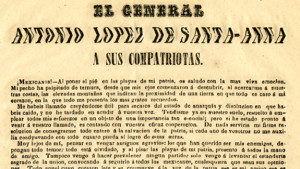
opening of message from Antonio López de Santa Anna to the Mexican people on his return from exile in Colombia, 1853 (from the Mexico Documents Collection)
As part of our Hispanic Collections, the Mexico Documents Collection is a small assortment of documents related to the government and people of Mexico, sure to provide some interesting research. The collection was assembled from another, larger collection of manuscripts and is available for study thanks to the generosity of a handful of donors.
Given the variety of the collection’s sources, what has emerged is a potpourri of papers dating back as far as 1570, running through the Texas Revolution, the Mexican-American War of 1846-1848, and extending as far forward as 1898. The documents run the gamut from dealing with the administration of states and territories such as Tamaulipas to communiqués and decrees from Antonio López de Santa Anna.
Researchers and scholars with fluency in Spanish should find these materials wholly approachable. However, for those whose Spanish may be limited, English translations are available for many of the documents. Information regarding provenance, when known, has also been included alongside the materials.
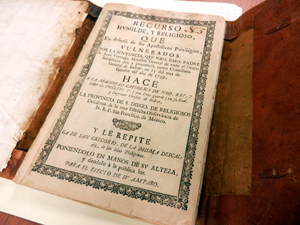
petition from the Barefoot Monks to Philip V, King of Spain (from the Mexico Documents Collection)
A detailed finding aid for the Mexico Documents Collection is available online and the collection itself remains open and available for study in the Special Collections Reading Room, at the University of Houston. No appointment is necessary and we look forward to assisting you with your research when you are ready to visit us.
Leonor Villegas de Magnón earned five medals for her service during the Mexican Revolution. What makes this unlikely war hero even more remarkable is that much of that service during the war came north of the Rio Grande. Born in Nuevo Laredo, Mexico and educated in the United States, Magnón made her life in the U.S. as fighting engulfed the competing factions to the south. A teacher by trade, her stake in history would come as a journalist and activist in the Mexican Revolution with her formation of La Cruz Blanca.
As the fighting of the Mexican Revolution butted against the border of Texas in the city of Laredo, Magnón crossed the border to help provide medical assistance to the wounded and eventually converted her home and adjoining facilities into a makeshift wartime hospital. This organization, cobbled together by Magnón in the crucible of war, became known as La Cruz Blanca and provided medical assistance to the wounded regardless of their political leanings. Despite her attempts at establishing the neutrality of La Cruz Blanca, she still found herself under scrutiny from American army officials wary of violations of neutrality. Smuggling soldiers in and out for medical care became a danger in and of itself as soldiers caught crossing the border were often detained and taken into custody by the U.S. Army.
The Leonor Villegas de Magnón Papers include original ledgers and documents related to the organization and operation of La Cruz Blanca. In addition, this collection holds personal documents, writings, photographs, as well as original documents and manuscripts related to her autobiographical work The Lady was a Rebel (or La Rebelde). Forward-thinking, Magnón handled her own translations, penning both the English and Spanish language tale of her life and the critical role of La Cruz Blanca. Both versions of this novel are published by Arte Público Press.
Do take the time to look through the detailed finding aid to see what other gems might be found and come visit us when you are ready to take a longer look at a truly revolutionary woman.
